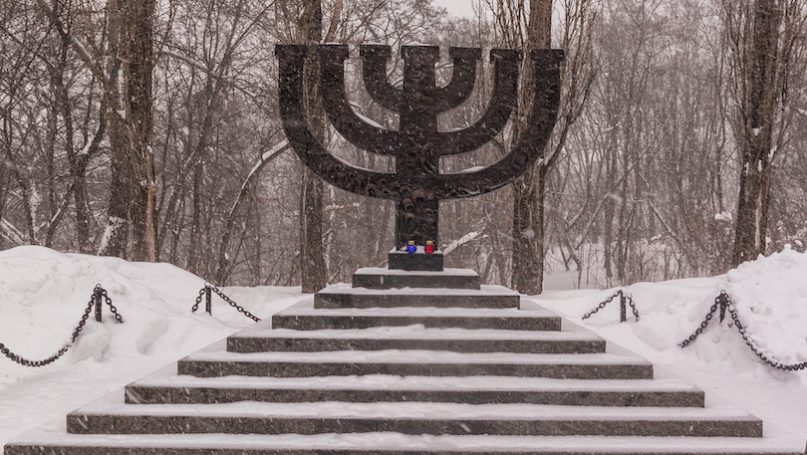
As Russia advanced on Ukrainian cities during its 2022 invasion, a missile strike on 1 March on Kyiv’s TV tower produced collateral damage to the Holocaust Memorial of Babyn Yar. Known as “holocaust by bullets”, Babyn Yar’s memorial is a capital landmark. In a country with a large Jewish population and a Jewish president, the Russian attack further stamps on the graves of those who have already egregiously suffered. Fortunately, the large menorah, synagogue and a monument honoring Soviet prisoners of war escaped the blast. Speaking directly after the attack, President Volodymyr Zelensky said it was “beyond humanity” and accused the West of not doing enough to prevent attacks on his country. “What is the point of saying ‘never again’ for 80 years, if the world stays silent when a bomb drops on the same site of Babyn Yar? At least five killed. History repeating itself…”
Babyn Yar – also known as Babi Yar – is among the biggest World War Two mass graves in Europe. Massacres at the site included Soviet prisoners of war, Romani, communists, and Ukrainian nationalists. It is estimated that between 100,000 and 150,000 people were killed at Babi Yar during the German occupation.
Writing to Israeli journalist Shlomo Even-Shoshan on 17 May 1965, Anatoly Kuznetsov commented on the Babi Yar atrocity: “Ukrainians, Russians, Gypsies, and people of all nationalities were murdered in Babi Yar. The belief that Babi Yar is an exclusively Jewish grave is wrong… It is an international grave. Nobody will ever determine how many and what nationalities are buried there, because 90% of the corpses were burned, their ashes scattered…”. Jewish commemoration efforts encountered difficulty because of the Soviet Union’s policies. Yevgeny Yevtushenko’s 1961 poem “Over Babi Yar there are no monuments” is also the first line of Shostakovich’s Symphony No. 13. In 2006, Yad Vashem and other Jewish organizations started to trace the Babi Yar victims. However, so far, only 10% have been identified.
“It is symbolic that Russian President Vladimir Putin starts attacking Kyiv by bombing the site of the Babyn Yar, the biggest Nazi massacre,” said the chair of Babyn Yar’s advisory board, Natan Sharansky. Putin has called Ukraine’s leaders “neo-Nazis” and declared his goal as the “denazification” of the country. Sharansky said the Russian leader had sought “to distort and manipulate the Holocaust to justify an illegal invasion of a sovereign democratic country” in an “utterly abhorrent” move.
Israel’s Yad Vashem Memorial immediately called for an end to “abusing and distorting the memory of the Holocaust”. Ukraine’s president is himself Jewish and his family suffered under the Nazi regime. Volodymyr Zelensky has often told his “story of four brothers” – his grandfather and three great-uncles – all of whom fought in the Soviet Army against Nazi Germany. Only his grandfather survived. The president was also actively involved in the creation of the memorial at Babyn Yar, Sharansky said.
“Such a missile strike shows that for many people in Russia, our Kyiv is completely foreign. They know nothing about our capital. About our history” – Zelensky observed – “but they have an order to erase our history. Erase our country. Erase us all.” While official figures put Ukraine’s Jewish population at 43,000, the European Jewish Congress believes it numbers at least 360,000. “The Soviets had tried to wipe out Babyn Yar’s brutal history in an effort to suppress any mention of the atrocities committed against Jews”, Sharansky told the BBC. “They physically tried to destroy these graves and delete the history, it’s unbelievable how important it was for Soviets to change the nature of the place….A few years after the Nazis attempted to cover their own tracks, the Soviets tried to flood the ravine with mud. Then in the 1960s, there was anger at plans to build a sports stadium there”. Sharansky said the construction of the TV tower directly adjacent to the memorial in the 1970s was another attempt to “destroy the memory of the Holocaust”. “There were so many attempts to erase Babyn Yar and change its nature, finally we turned it into a big memorial, and that is once again overshadowed by Russian aggression” he said.
For decades under Soviet rule, this massacre site possessed a simple obelisk that referred to “Soviet” victims, without even mentioning Jews. Finally, in the 1990s, a large Menorah monument was erected, when independent Ukraine commemorated Jewish victims. In 2021 a synagogue was opened. “Rather than being subjected to blatant violence, sacred sites like Babi Yar must be protected,” Yad Vashem stated. Israel’s Foreign Minister, Yair Lapid, offered to repair the damage to the site. And the Holocaust Memorial Day Trust in the UK said it was “shocked” and “horrified” to hear of the attack.
The events of 1 March 2022 cause us to revisit this massacre in Ukraine’s dark heritage. With hope, the fears of President Zelensky will not be realized and the grim cycle of history does not repeat itself.
Further Reading on E-International Relations
- Opinion – A Hidden Victory? The Winter War and Russia’s Invasion of Ukraine
- Opinion – Russia’s Choices in Ukraine
- Opinion – The Rationale of Russia’s ‘Special Military Operation’ in Ukraine
- Opinion – Strategic Perspectives on the Russia-Ukraine War
- Opinion – The Impact of the Russia-Ukraine War on European Nationalism
- Opinion – On and Beyond Whataboutism in the Russia-Ukraine War